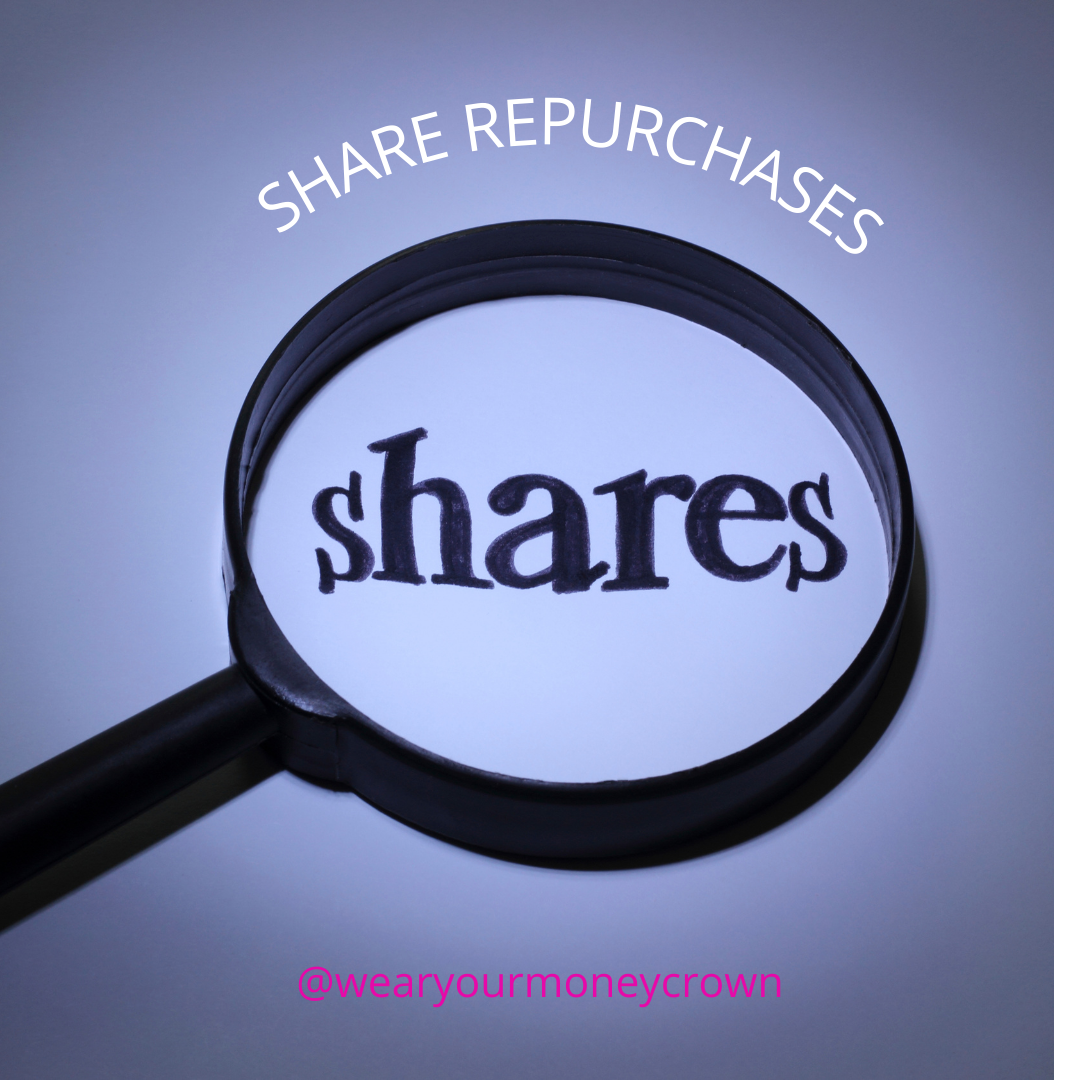Last week, Starbuck’s returning CEO, Howard Schultz, announced that the company was revitalizing the chain as it navigates rising costs, broadening unionization push among U.S. baristas, and supply chain issues. He also announced the suspension of their buyback program (share repurchases), which had started last Fall.
As a consequence, its shares fell around 8% after the announcement and have continued to slide since the 4th of April.
That’s why I thought it was important to explain what Share Repurchases are & what we need to understand as investors.
Share repurchases became a bit of a thing in 2021. In fact, according to statistics, companies in the S&P 500 repurchased a record of $882BN shares in 2021 and Goldman Sachs analyst estimate this figure could exceed $1 trillion this year. Wowzers!
A share repurchase is when a publicly-listed company re-acquires its shares by buying them back in the public marketplaces.
Anna Orenstein-Cardona
In a nutshell, the market (meaning investors) perceive this as positive news and the company’s share price tends to rise. However, as investors we need to understand the dynamics surrounding share repurchases.
Why do companies buyback their shares?
There are a few reasons companies do this and I will outline them below, however one point I want you to keep in mind: A company’s board has fiduciary responsibility to provide as much value as possible to their shareholders.
With a share repurchase a stock’s price increases in value, which is fabulous for shareholders AND board members. After all, don’t forget that many board members get compensated in stocks. As such, when the company’s stock rises, it is mutually beneficial to shareholders and board members.
That’s why I always say that when we buy shares, we form a relationship with that company!
Now, there are quite a few reasons why a company would repurchase its shares but the MAIN FOUR reasons are outlined below:
SUPPORT STOCK PRICE:
A company wants to send a market signal that its stock price will be “supported” for whatever reason. For instance, a company may think its shares are trading too low and by issuing a buyback that will increase the price.
How does this work?
Regular supply and demand dynamics. If the demand for the stock remains the same (constant) and supply is reduced, the stock’s price gets an automatic lift.
FINANCIAL METRICS:
There are certain financial metrics/figures that benefit from a share buyback, such as EPS (earnings per share).
EPS measures the NET INCOME that is earned per share of a company’s common stock. The calculation is Net Income divided by the weighted average of their common shares outstanding.
A higher EPS indicates greater value to a shareholder bc it means they will receive more profits. As such, the less shares, the higher the EPS.
Warning – Remember in a way this is an artificial inflation of EPS, so be mindful when performing your research.
INCREASE STAKE:
It could also be that a company simply wants to increase its own equity stake for higher flexibility with the direction and strategy they wish to pursue. Remember that when you own shares, many times you have voting rights. As such, by buying those shares back the company can garnish more control.
DIVIDEND STRATEGY:
Finally, it can be a dividend play/strategy on behalf of the company. For instance, if the company had received some EXTRA CASH from a sale or special event (like a sale of equipment or perhaps the disposal of a part of its business), they will NOT want to commit to paying a dividend (if it doesn’t already) OR to increase its existing dividend.
Why?
It’s quite simple. Remember that an ongoing dividend is a bit of a burden on a company.
If their profits were to decrease and as a result, they needed to reduce the dividend payments, well it would potentially upset their shareholders (no bueno). Therefore, it’s easier to give shareholders money by buying back their stock rather than increasing dividends.
Also, keep in mind the tax impact on big shareholders. Let’s say that you own a lot of shares in company XYZ. Suddenly, company XYZ decides to massively increase its dividend. Yes, on one hand you are happy (woo hoo!), but on the other hand you suddenly face a pretty HEFTY tax bill (argh!).
However, if company XYZ decides to do a share repurchase instead, then you benefit from the price of your shares rising, which in turn can help you get higher capital gains (you don’ pay tax unless you sell) & have less of a tax liability (win-win).
So, there we have it friends!
As investors, we need to understand the dynamics around share repurchases because at the end of the day, they impact the price of our investments.
Remember that if you have any questions on this topic, you can reach out.
Meanwhile, remember to Wear Your Money Crown & Rule Your Finances!
XOXO,
Anna
Subscribe to our email list for future financial news, helpful tips, and updates, please do so today using this link https://successful-composer-5444.ck.page/ac0d024952.
JOIN our Free Facebook Financial Community at https://www.facebook.com/groups/wearyourmoneycrown.
Any questions regarding this post, please email us at info@wearyourmoneycrown.com
